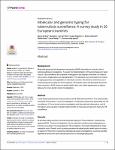Molecular and genomic typing for tuberculosis surveillance: A survey study in 26 European countries
Andrés, Marta
van der Werf, Marieke J.
Ködmön, Csaba
Albrecht, Stefan
Haas, Walter
Fiebig, Lena
Survey study group
Background
Molecular typing and whole genome sequencing (WGS) information is used for (inter-) national outbreak investigations. To assist the implementation of these techniques for tuberculosis (TB) surveillance and outbreak investigations at European level there is a need for inter-country collaboration and standardization. This demands more information on molecular typing practices and capabilities of individual countries. We aimed to review the use of molecular/genomic typing for TB surveillance in European Union and European Economic Area countries in 2016; assess its public health value; and collect experiences on typing data use for cross-border cluster investigations.
Method
A web-based questionnaire was provided to all TB National Focal Points. The questionnaire consisted of three parts: i) Use and integration of molecular and genomic typing data into TB surveillance; ii) Cross-border cluster investigation and international collaboration, and iii) Perception and evaluation of public health benefits of molecular and genomic typing for TB surveillance.
Results
Of 26 responding countries, 20 used molecular typing for TB surveillance, including nine applying WGS. The level of integration into the national surveillance was heterogeneous. Among six countries not using typing for TB surveillance, more than half planned its implementation soon. Overall, most countries perceived an added public health value of molecular typing for TB control. Concerning international cluster investigations, countries had little experience and did not have standard protocols to exchange typing data.
Conclusion
Our study shows a wide use of molecular and genomic typing data for TB surveillance in EU/EEA countries and reveals that transition to WGS-based typing is ongoing or is considered in most countries. However, our results also show a high heterogeneity in the use and integration of typing data for TB surveillance. Standardization of typing data use for TB surveillance is needed and formal procedures should be developed to facilitate international collaboration.
Files in this item

